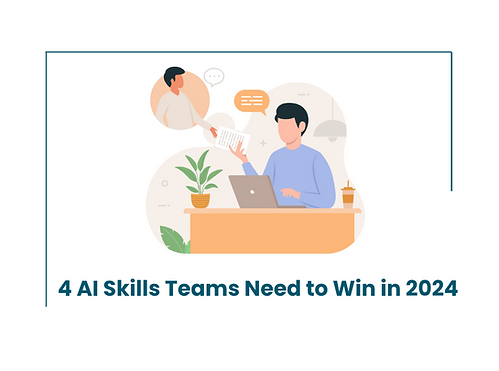Artificial intelligence remains the hottest topic in the business world today. It doesn’t take a crystal ball to foretell that the buzz around AI isn’t dying down anytime soon. More than half of all CEOs surveyed by Deloitte say they are evaluating AI platforms or experimenting with the technology already.
But as with any fast-moving innovation, owners and business leaders must always keep in mind the human element as they integrate AI into their operations. Our organization, Louder Co., believes every company interested in empowering professional success through AI should ask one critical question: “Does my team have the right mix of skills to make AI truly work for the benefit of both the company and themselves?”
If your employees don’t have the right skill set, an AI implementation can be worse than just a waste of money—it can turn into a disaster. Of course, this risk isn’t limited to AI. Any equipment or software purchase designed to improve your business may end up harming it if your team isn’t prepared with the right skills and training. A fantastic example of just how wrong things can go wrong comes from cosmetics giant Revlon.
In early 2018, Revlon deployed a new enterprise resource planning (ERP) platform to run every aspect of its complicated operations. Despite the company’s ambitious plans and expectations of a flawless rollout, the ERP was an unmitigated disaster. It forestalled production, caused customer shipment delays, and even resulted in a shareholder lawsuit. The problem? The organization didn’t have the right skills to handle such software integration.
The good news? Key skills to make AI a powerful asset to your business are not arcane tech specializations like ERP implementation. Instead, companies thriving in the AI era must focus on developing core skill sets in workers to get the most out of artificial intelligence tools—whether it's generative AI like ChatGPT Enterprise or creative tools—like Adobe Firefly AI.
Here are skills your team should develop before flipping the AI switch:
As the Internet took over the business world, those who could source the right answers on search engines were said to have good “Google-Fu.” But being adept at finding info on Google has never been a matter of being an expert programmer or being “plugged into the matrix.” Rather, it comes down to smart language usage and some handy advanced search techniques.
AI has its version of the Google-Fu skill related to prompting. When you type a question into ChatGPT, you’re creating a prompt. Clear, concise, and accurate prompts enable AI to produce exactly what your team needs. By developing strong prompting skills, your employees will get faster and more accurate answers with lowered risks of being sent on a wild goose chase.
Validating data provided by AI and performing constant sanity checks is a critical skill that should be baked into business processes utilizing AI. Why? There is a dangerous tendency for employees to overly trust AI once they see it in action. As one healthcare VP explained in the Wall Street Journal, “If you put an AI in there, and it works five times in a row, I can see it’s like: if you don’t double-check it, what’s the worst that can happen?”
This attitude can be deadly for small and medium businesses.
AI can make mistakes or provide bad information when prompts are misunderstood, or faulty source data is in the system. On the other hand, companies successfully using AI systems become experts at verifying data. As another executive told the WSJ, “If you don’t have humans fact-checking, governing, and putting this into some sense of reality, then you’re missing it.”
Cybersecurity/Threat Awareness
AI holds great potential to make your employees more productive. The bad news is it holds the same potential for those operating on the wrong side of the law. Tech experts, including Wired magazine, have been raising the alarm about hackers and other cybercriminals using AI for such nefarious deeds.
This trend will only worsen in 2024.
To combat the threat, every employee must be vigilant. This can take many forms, such as training on how to avoid phishing attacks. In many cases, it will also involve learning more about an AI platform they use daily. Hackers may still try to compromise your workers’ systems by sending links appearing to be to their ChatGPT or other AI platform login—a new spin on traditional phishing attacks.
It is therefore up to every employee to stop and think before they click.
Effective problem-solving has been a valuable skill since the dawn of time. But as AI continues to gain steam, strong critical thinking skills are more vital than ever. One reason for this is that AI can reduce routine and repetitive work in your employees’ day, giving them the needed time and space to tackle more impactful work. Without such strong skills, they might be tempted to spend their newfound time browsing Amazon for the latest deal, providing no additional value to your organization.
Even so, problem-solving skills are critical to getting the most out of AI business processes. The ability to determine when something might be going off the rails and fix the issue before it completely derails your operations is undeniably useful.
Ultimately, AI holds great promise to improve the efficiency and profitability of practically every business in the U.S. Preparing your employees with the skills to get the most out of artificial intelligence is an essential component of any platform selection and implementation process—and you needn’t go through it alone.
Louder Co.’s team of AI experts is ready to help.
Our team works closely with each client to not only find the right platform to suit your needs, goals, and current business practices but also to implement your chosen platform in a way that sets you and your people up for success. AI done right is a win-win, and we can show you how. Contact Louder Co. today to discuss how we can help you break through with AI in 2024.

